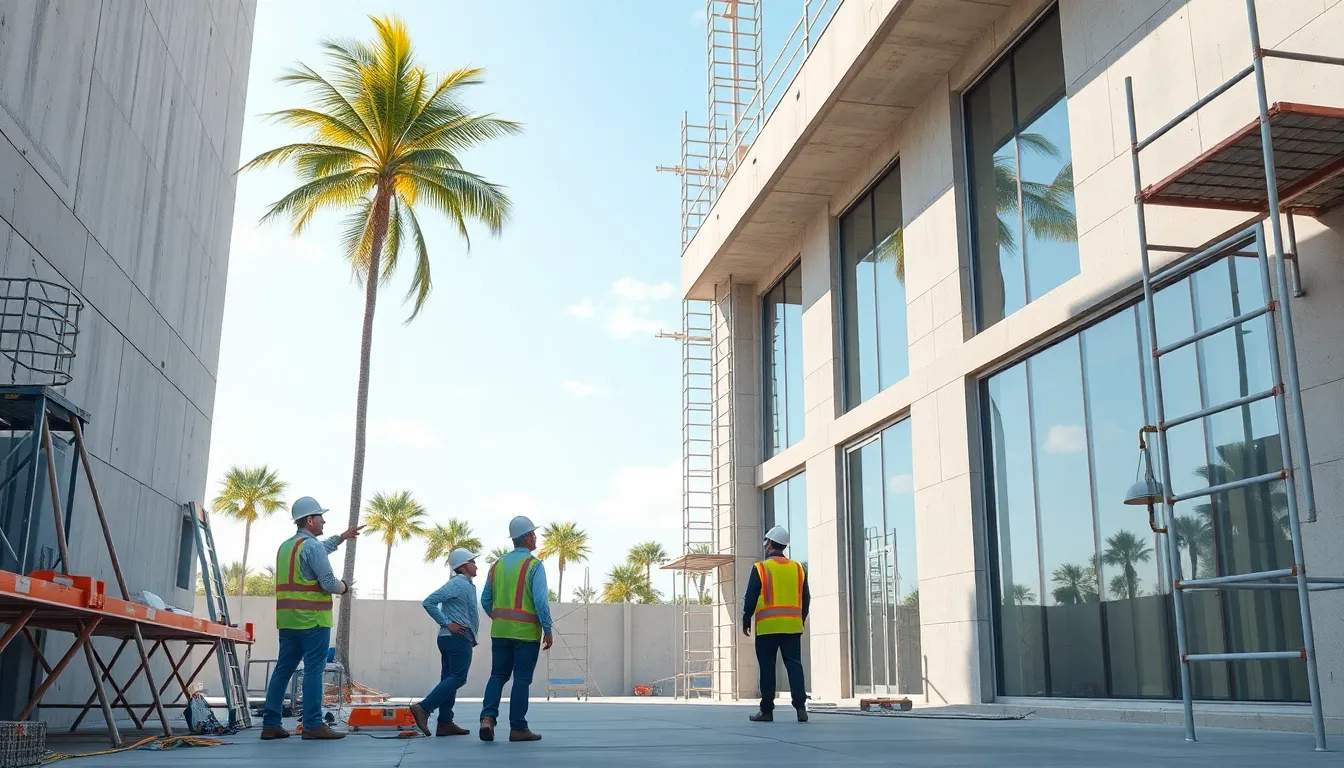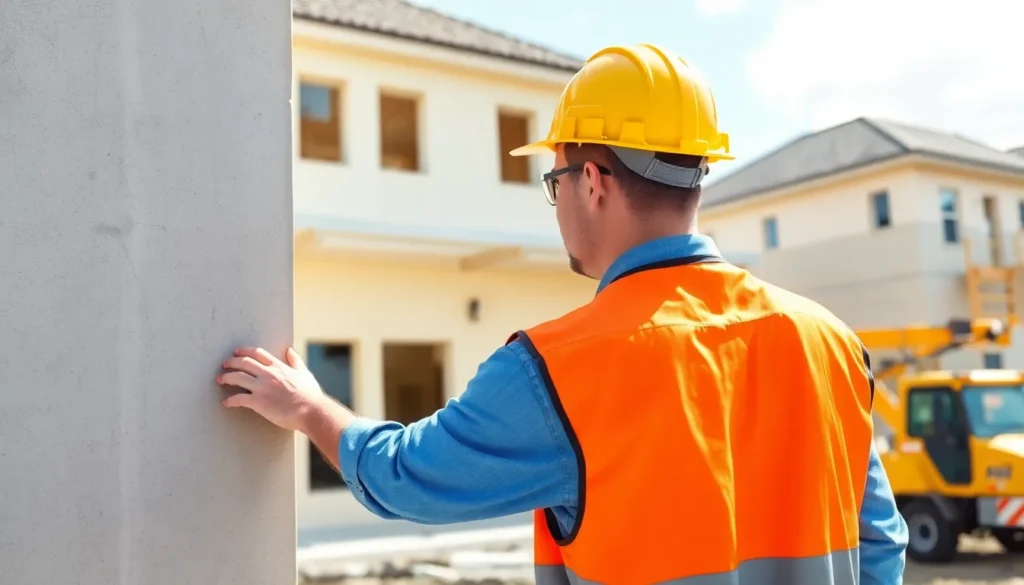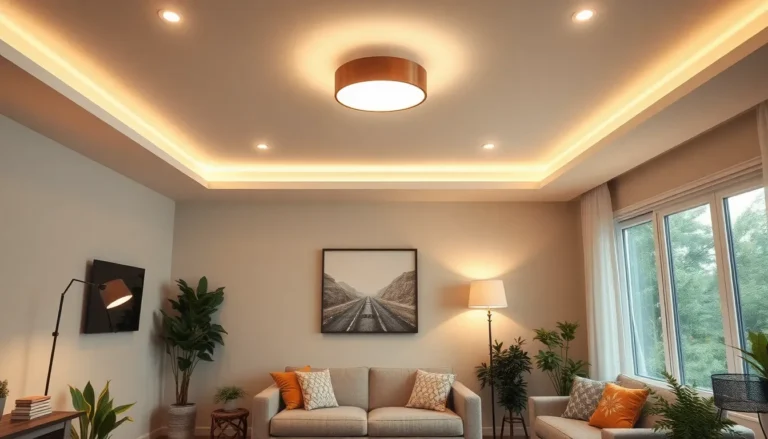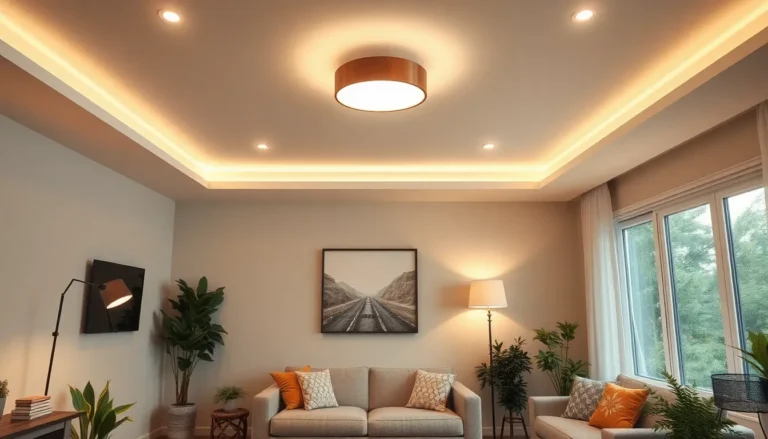Table of Contents
ToggleWhen it comes to building in the Sunshine State, Florida’s building codes for exterior wall construction are no joke. They’re designed to keep homes safe from hurricanes, high winds, and the occasional alligator that thinks your backyard is its personal playground. Understanding these codes isn’t just about compliance; it’s about ensuring your home can withstand whatever Mother Nature throws its way.
Overview of Florida Building Code
Florida’s building code establishes comprehensive guidelines for exterior wall construction. Adherence to these regulations significantly reduces the risk of damage from severe weather events. These codes emphasize materials that enhance structural integrity, including reinforced concrete, impact-resistant glass, and durable siding options.
The code categorized walls based on their location and exposure risk. Walls in coastal areas, for example, face stricter requirements than those situated inland. Code provisions mandate specific tests for materials to ensure wind resistance and moisture control. Compliance with thermal insulation values is essential for energy efficiency, enhancing overall performance.
Updates occur regularly, reflecting advancements in technology and changes in environmental conditions. Authorities encourage builders and contractors to remain informed about ongoing code changes. Local building departments offer resources to assist professionals with compliance strategies. Licensing and inspecting professionals in the housing industry enhances accountability in construction practices.
Non-compliance may result in significant financial consequences, including fines or delays in project approvals. Builders must prioritize understanding these regulations to mitigate risks associated with future hurricanes or tropical storms. Additionally, inspections often verify materials and construction methods adhere to specified standards.
Florida’s building code serves as a proactive approach to enhancing safety and resilience in construction. Navigating these codes ensures buildings withstand Florida’s unique environmental challenges effectively. Stakeholders involved in the construction process should prioritize familiarity with these codes to protect both investments and inhabitants.
Importance of Exterior Wall Construction

Exterior wall construction plays a critical role in a building’s overall performance and safety. Strong exterior walls protect against extreme weather events, especially in Florida, where hurricanes and high winds pose significant risks.
Structural Integrity
Structural integrity relies on the selection and installation of appropriate materials. Florida’s building code mandates the use of reinforced concrete and impact-resistant glass, both vital for maintaining stability during severe storms. Building professionals must understand how different wall constructions face environmental pressures. Compliance with specific testing procedures ensures walls can withstand wind loads. Robust designs not only prevent damage but also enhance longevity. Regular inspections confirm that construction standards are met, further ensuring safety and resilience for inhabitants.
Energy Efficiency
Energy efficiency hinges on effective wall construction methods. Thermal insulation within walls contributes to reduced energy consumption, aligning with Florida Building Code requirements. Proper insulation minimizes heat transfer, keeping indoor temperatures regulated. Energy-efficient walls also lower utility bills for homeowners, making living conditions more comfortable. Innovative materials that provide moisture control and ventilation support sustainable practices, enabling homes to adapt to Florida’s unique climate. Overall, thoughtful wall design fosters energy conservation while complying with building regulations.
Key Requirements for Exterior Walls
Understanding the key requirements for exterior walls ensures compliance with Florida’s building codes. These guidelines protect homes against severe weather events.
Materials and Specifications
Florida’s building code mandates specific materials for exterior walls. Reinforced concrete offers strength and durability, while impact-resistant glass minimizes damage from wind-borne debris. Compliance with standards for moisture control prevents water intrusion, enhancing structural integrity. Builders must obtain tests proving that materials meet required wind resistance levels. Proper installation according to the code specifications plays a vital role in wall performance. Enhanced durability results from selecting suitable materials tailored for regional climate conditions.
Insulation Standards
Energy efficiency depends significantly on insulation standards outlined in Florida’s building code. Walls must feature insulation that meets minimum R-values to promote thermal efficiency. Proper insulation aids in maintaining comfortable indoor temperatures and minimizes energy costs. Homeowners benefit from reduced utility bills when insulation is effectively installed. Local building departments often provide guidance on selecting approved insulation types. Understanding these requirements contributes to long-term energy savings and improved home performance. Ensuring compliance serves both regulatory and economic interests for builders and homeowners.
Common Types of Exterior Walls in Florida
Florida homeowners choose various types of exterior walls based on climate conditions and building codes. The following wall types are commonly used in the state.
Stucco Walls
Stucco walls provide a durable and aesthetically pleasing finish suitable for Florida’s humid climate. Known for their ability to resist moisture, stucco minimizes the risk of water damage. This material also offers excellent insulation properties, contributing to energy efficiency. Regular maintenance can enhance its longevity, including resealing every few years. Builders must use a proper base and ensure installation adheres to the Florida Building Code guidelines for moisture control.
Vinyl Siding
Vinyl siding presents an appealing option for many Florida homes. Low maintenance is a significant advantage, as vinyl does not require painting and resists fading from UV exposure. Additionally, it’s available in various colors and styles, enabling homeowners to achieve desired aesthetics easily. Installation must consider local building codes, particularly those addressing wind resistance in coastal regions. Energy-efficient options enhance insulation, helping reduce energy bills for homeowners.
Brick Walls
Brick walls stand as a classic and robust choice for exterior construction. Offering exceptional strength, they withstand high winds and provide adequate noise insulation, beneficial in busy areas. Durable and low maintenance, brick requires minimal upkeep compared to other facade options. Properly installed brick walls comply with Florida building codes, ensuring they control moisture and provide insulation. Their timeless appearance gives homes a sophisticated look, making them a favored choice among many homeowners.
Compliance and Inspection Process
The compliance process for exterior wall construction in Florida involves adherence to specific building codes. Builders must submit plans to local building departments for review and approval. Understanding local amendments to the Florida Building Code is essential, as variations can exist based on regional needs.
Inspections occur at various project stages to ensure compliance with the established codes. Initial inspections typically focus on foundation and framing. Subsequent inspections verify the proper installation of exterior wall materials, ensuring they meet necessary performance standards.
Passing inspections confirms that materials like reinforced concrete and impact-resistant glass align with safety requirements. Each material undergoes rigorous testing to demonstrate its ability to withstand high winds and moisture intrusion. Regular updates to building codes reflect advancements in research and technology, requiring builders to stay informed.
Communication with local building departments can provide valuable resources for navigating compliance challenges. Inspectors offer guidance on required tests and documentation, paving the way for builders to understand expectations. Failure to comply can result in project delays and financial penalties, making knowledge of these codes critical.
Final inspections ascertain that the completed exterior walls perform as intended. Building inspectors evaluate aspects such as insulation requirements and moisture control measures. Proper compliance not only ensures the structural integrity of homes but also enhances energy efficiency, benefiting homeowners with lower utility bills.
Stakeholders should prioritize understanding the compliance and inspection process to achieve successful project outcomes. Building safe, durable homes in Florida depends on stringent adherence to these codes throughout construction phases.
Florida’s building code for exterior wall construction is vital for ensuring the safety and longevity of homes in a region prone to severe weather. By adhering to these regulations, builders not only protect their investments but also enhance the resilience of structures against hurricanes and other environmental threats.
The emphasis on quality materials and proper installation is essential for achieving compliance, which ultimately leads to improved energy efficiency and reduced utility costs for homeowners.
Staying informed about local amendments and engaging with building departments can streamline the compliance process, ensuring that all construction meets the highest standards. Prioritizing these aspects will contribute to safer communities and more durable homes throughout Florida.







